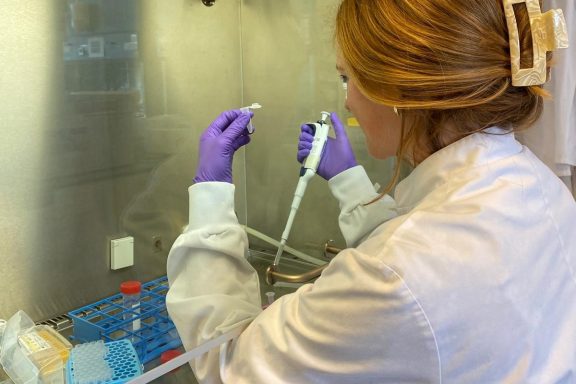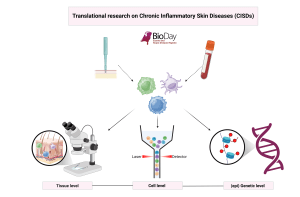Exploring the immune mechanisms behind skin diseases, our translational research connects clinical care with cutting-edge laboratory science.

With our translational research we translate questions from the clinics to tests or experiments in the laboratory and vice versa; we translate observations from the lab to answer questions derived from our clinical department. This type of research requires a close cross-departmental collaboration with researchers from our clinical research team, the Center for Translational Immunology (CTI), medical microbiology, pharmacy, and other clinical departments. Working in a diverse team of experts gives us the opportunity to approach real world questions from different perspectives and learn from each other. This unique teamwork provides us with a complete picture from cell to patient!
The pathogenesis of CISDs predominantly involves CD4+ T helper (Th) cell-mediated responses. For AD and PN we know that type 2 (Th2) cell-mediated responses play a central role, leading to a type 2 inflammatory cascade marked by elevated levels of interleukins (IL)-4, IL-5, IL-13, IL-31, thymus and activation-regulated chemokine (TARC/CCL17), and pulmonary and activation-regulated chemokine (PARC/CCL18) in both skin and blood. These exciting findings in immuno-dermatology of the past few years have led to the development of biologicals, JAK-inhibitors and OX40-inhibitors, very effective therapies which are increasingly deployed for the treatment of T-cell mediated skin diseases.
The targets of these therapies all play a specific role in the complex interplay of cells, tissues and their communication systems which together constitute our immune system. Our translational research is focused on the analysis of biomaterial from patients with T-cell driven skin diseases who are treated with new therapies such as biologicals or JAK-inhibitors, to increase our knowledge on immune cell behavior both systemically and locally (in the lesional and non-lesional skin) during these therapies, and the effect these changes in behavior have on the clinical course of the disease. Translational studies with biomaterial from CISDs will add not only to our knowledge and understanding of these therapies, but also unveil new mechanisms in the pathophysiology of these diseases. We aim to look at immunological phenomenon underlying multiple CISDs, in a ‘disease overarching’ manner, so for specific research questions we can look at biomaterial from patients with different diseases (eg. AD, psoriasis, cutaneous T-cell lymphoma).

Are you looking for a master’s internship and excited about joining our translational research team at the Center for Translational Immunology (CTI)?
Feel free to contact us at F.vanWijk@umcutrecht.nl we’re always happy to hear from motivated students!